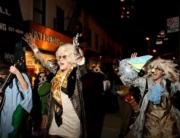
Peter Davies, center, in 56 UP (Harriet Gill/ITV/First Run Features)
![]() With 56 Up, the granddaddy of longitudinal documentaries, impressively reaches grandparenthood.
With 56 Up, the granddaddy of longitudinal documentaries, impressively reaches grandparenthood.
Michael Apted’s first job was as a researcher selecting a cross-section of 14 British seven year olds for the 1964 U.K. TV documentary Seven Up!, and then, amidst his Hollywood film career, he’s been the director for each reunion every seven years since. (The U.S. caught up with the series with 1985’s 28 Up.) How to consider this eighth installment of these extraordinary filmed portraits through time?
Will you want to see 56 Up if you’ve (not yet) watched any or some episodes? Yes.
Will fans of the entire series still be surprised by this frank, first-person saga of real lives? Yes.
Does 56 Up continue to reveal as much about the heard (but not seen) Apted as his interviewees? Yes.
For newbies, all the riveting episodes portentously open with the maxim from Seven Up!: “Give me a child until he is seven, and I will give you the man.” Each child’s striking personality was refracted through the British class structure. Even Americans could perceive the differences among the variety of accents, homes, and their schools. In 56 Up, those past decades flicker by in seamless, fleeting montages as each interviewee, and many of their (changing) spouses, thoughtfully reflect on their lives, careers, relationships, and families. Generally, they grow (and gray) from innocent child to sullen teen, then hesitant adult, and onward through their messy twenties and thirties into a more settled middle-age with portends of mortality. There are only occasional (and not always predictable) comments about political and economic policies. While they have mixed feelings about participating in the series, what strongly comes through now is their proud individuality and insistence that their trajectories were determined by their own choices.
The Cockney swagger of the earthy East Enders is ever engaging: three confident girlfriends—Jackie, Lynn, and Susan, always brought together for a joint interview—and the charming jockey-turned-cabbie Tony with his hard-working wife. The two boys who boarded in a children’s home, Symon (the only participant of color) and Paul (whose family’s stability was helped by emigrating to Australia), admit to a perennial lack of confidence in their labor options until they were bolstered by supportive wives.
The upper-class Andrew, Charles, and John have eerily achieved what they set out to accomplish from their precocious childhood plans. They attribute their success to hard work, not social or educational advantages, controversial stances that may be why they have participated irregularly. Three other boys from the farm or suburb—Bruce, Nick, and Peter—evinced the most empathy and intellectual curiosity from a young age, and their lives challenge assumptions about social class, even as they are resign to the frustrations and limitations in what they could achieve.
Those who are already addicted to this early reality show (available in a convenient box set that should be on your viewing bucket list or queue) will be satisfied that all but one of the originals has returned. (It seems too ironic that the one who refuses to return became a documentary producer for a rival network.) As before, a surprising friendship has developed between two participants, and Apted arranges sentimental field trips to old neighborhoods. This time, though, no one challenges the interviewer or answers through clenched jaws. They comfortably address the director as “Michael.”
Even the reluctant ones, who participate only to promote personal projects, carefully clarify what they feel were Apted’s previous misrepresentations, with reasonable objections. The earlier episodes emphasized class differences (producer Granada TV then swung left) over familial context that they all say had more of an impact, and are more important to them now as a marker for life success. Nick the professor recalls that an Oxford classmate once remarked that he had never before heard someone with a Yorkshire accent sound so intelligent, and the youthful Apted initially portrayed the same bias about folks he now thinks of as extended family.
But the caustic view of British society has faded for Apted since he moved to the U.S. in the 1980s. In his essential commentary on the 42 Up DVD, he regrets not choosing more females, and he tries to balance that by including wives who were willing to be filmed, but he had to play catch-up on women’s issues. Though he grilled the young upper-income women if they would be using nannies, he missed the point that staying home to raise their kids was an affordability indicator. It’s not until later years that the working-class women emotionally explain that their parents were necessary childcare providers, support that they repeat today with their grandchildren.
To an American viewer, the expectations the parents have for their children are still startlingly complacent regarding the lack of social mobility into the next generation. It isn’t clear if those who had attended boarding schools (some unhappily) had their progeny follow, and Apted doesn’t press them about their educational expectations as parents. (Significantly, the only two kids of working-class participants who went to college lived outside the U.K.) Instead, as Apted sympathizes from his own divorces and family relationships, he emphasizes the universality of life experiences, which makes 56 Up especially appealing to a wide audience.






Leave A Comment